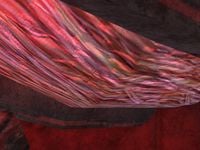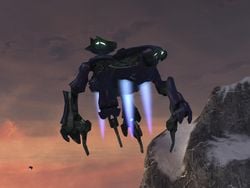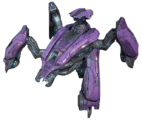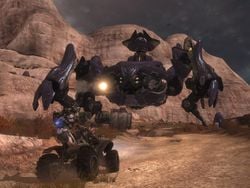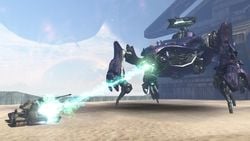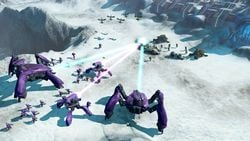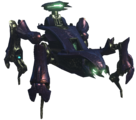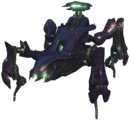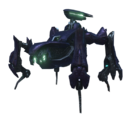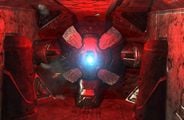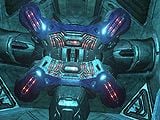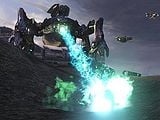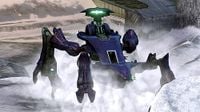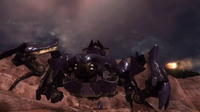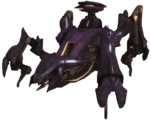Deutoros-pattern Scarab
From Halopedia, the Halo wiki
| Type-47B Ultra-Heavy Assault Platform | |
|---|---|
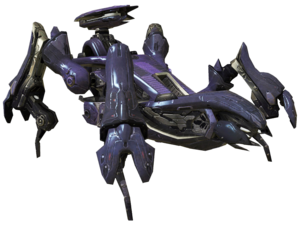
| |
| Production information | |
|
Manufacturer: |
|
|
Product line: |
|
|
Model: |
|
| Technical specifications | |
|
Length: |
|
|
Width: |
48.3 meters (158 ft)[2] |
|
Height: |
38.7 meters (127 ft)[2] |
|
Mass: |
171.8 metric tons (169.1 LT; 189.4 ST)[2] |
|
Maximum speed: |
76 kilometres per hour (47 mph)[2] |
|
Armament: |
|
|
Crew: |
|
|
Complement: |
|
| Usage | |
|
In service: |
|
|
Role(s): |
|
|
Affiliation: |
|
- "Pro tip: Shoot them in the legs first. And it's okay to cheer when you blow one of them up. You deserve it."
- — Spartan Edward Buck, offering advice on how to destroy a Deutoros Scarab[4]
The Type-47B 'Deutoros' Ultra-Heavy Assault Platform,[5] more commonly known as the Scarab, is a large, heavily armored, all-terrain, quadrupedal walker. Classified as a tier-four Excavator, the Type-47B Scarab was employed by the Covenant as a siegeworks ultra-heavy artillery assault platform.[2]
Originally designed strictly for mining operations and deep excavations on widely varied terrain,[1][5] the Scarab has since been repurposed for combat.[3] The walker is used to attack heavily defended structures and emplacements and to provide nearly-unstoppable combat support for Covenant ground forces. A heavily-fortified and dexterous mobile platform that boasts impressive levels of firepower, the Scarab is known for striking fear into its opponents.[5]
Specifications
Design details
- "It's a tank the size of a building that walks around on four legs bent like a spider's, and it bristles with enough weaponry to qualify as a mobile demolition platform."
- — Spartan Edward Buck, referring to a Type-47 Scarab[4]
At least two models of the Scarab exist: the Deutoros and the Protos.[2] Both models are extremely powerful, possessing potent armament and armor. The body of a Scarab features an interior bay and command center, where many of the vehicle's essential functionaries are accessible. An infantry platform that surrounds the enclosed bay allows the defensive personnel of the Scarab to fire upon hostiles from above or eliminate other threats.[1][5] Although the Scarab appears to be a traditional vehicle, it is actually a bio-mechanical construct that makes extensive use of Lekgolo.[1] Colonies of Lekgolo worms are bound together with the vehicle's control systems, though the gestalt is seldom given complete control of the entire Scarab; the Lekgolo meta-colonies that inhabit Scarabs are often populated by particularly unruly Lekgolo individuals that can not be trusted with total control over the vehicle without causing undesired chaos.[2] A central power junction located inside the Scarab's interior bay is one of the only locations on the walker where the Lekgolo are exposed.[5] Due to the Scarab's reliance on the Lekgolo and their ability to operate independently, the weapons platform was never truly categorized as a vehicle by the Covenant. The Scarab was classified as a single, ultra-heavy infantry[1] by the Covenant,[2] which is more accurate than the United Nations Space Command's formal designation.[1] The chassis of the Scarab is built in specialized, cavernous assemblies, such as the Assembly Forges on the now-destroyed Covenant capital city of High Charity. At these facilities, Lekgolo are fused into the carapace and appendages,[5] and bound to the control systems.[2] Like many vehicles, the Scarab is modularly crafted on an assembly line, where its various pieces are combined then activated.[5]
Scarabs are not without their weaknesses. A Deutoros Scarab will be temporarily stalled if its legs sustain enough damage,[4] causing the walker lower into a crouch-like position and allowing a would-be boarder to jump into the vehicle's troop bay. Despite its prodigious firepower, the Scarab is highly vulnerable to being boarded. The central power junction is protected only by the vehicle's external armor and the exposed Lekgolo are susceptible to weapon fire,[1] so attacking the junction is relatively easy once a hostile boards the craft. Once the core is destroyed, the Lekgolo gestalt's tissue tears and a chain reaction will occur, which will quickly destroy the craft.[5]
Mobility
Unlike most vehicles deployed by the Covenant, the Scarab does not employ anti-gravity propulsion to move; it instead uses a quadrupedal "leg" assembly for locomotion. These jointed legs are very powerful, strong enough to even withstand the shock of low-orbital drop.[6][7] Scarabs are equipped with several underside thrusters that allow the vehicle to slow its descent during its initial deployment.[6] The Scarab can move at a relatively fast speed, with a maximum speed at 76 kilometres per hour (47 miles per hour).[2]
The articulated legs and the spiked "feet" of a Scarab allow the vehicle to sturdily grip the ground, climb over obstacles, and even kneel down.[3] The legs are also very nimble, affording the Scarab a surprising degree of maneuverability; for example, the Deutoros Scarab can mantle inclines in excess of forty-five degrees[8] and can attempt to right itself if it is knocked off balance.[7] The Scarab is capable of carrying out excavations and assaults in varied terrains and rough environments.[1][5] The Deutoros Scarab is capable of operating underwater if only for brief periods.[8]
Crew and complement
The Type-47 Scarab is occasionally used as a mobile command base, and rarely as a large-scale troop transport vehicle.[3] An officer of the Covenant military serves as a supervisor and "pilot" aboard a Scarab. Rather than steer the walker, the Scarab's supervisor "guides" the direction of the machine and occasionally directs the artillery when needed; a Scarab's Lekgolo complement manage and carry out most of the walker's functions and processes.[5] The supervisor often operates the Scarab's weaponry when precision is needed, as the Lekgolo have no fine control over the armaments.[2]
As Scarabs were too valuable to operate without support, the Covenant fielded the walkers with a standard crew of one supervisor and twelve defenders when deployed in the field.[2] The accompanying infantry and supervisory personnel aboard a Scarab serve to prevent boarders from destroying the vehicle from within or from attempting to seize the walker for themselves. A Scarab could hold as little as five security personnel,[5] or as many as fifty aboard its infantry platform.[3] However, twelve was generally the standard amount of defensive personnel stationed aboard a walker to allow reasonable combat efficiency on the platform.[5] The security personnel aboard a Scarab were additionally charged with eliminating any hostiles that were able to survive the vehicle's bombardment of a location.[3] The security personnel of Scarabs typically consisted of lances of Unggoy and Kig-Yar, as well as some Jiralhanae and Sangheili.[9][10]
Armaments
The primary armament of a Scarab is an ultra-heavy focus cannon mounted on the "head" at the front of the platform.[1] The focus cannon is typically affixed to the Scarab's prow during its assembly towards the end of the vehicle's production.[5] The weapon fires a stream of superheated plasma, capable of decimating nearly any infantry or vehicle in its path. The focus cannon is a nearly capital ship-scale energy projector capable of both mass destruction or delicate stratigraphic excavation depending on the weapon's tuning and the operator's expertise.[2] The cannon is capable of melting through five feet of concrete, with one Scarab having enough firepower to level a small city.[3] In the Deutoros design the cannon is housed in a cradle that is protected by flaps, which open before firing. The focus cannon has a relatively low rate of fire and is typically discharged in brief bursts. As the weapon is fired, it releases a green-glowing liquid, which may be coolant. The effective range of the focus cannon is rather short,[9][10] being about 650 meters, and the blast can easily be evaded at a distance, but Scarabs have exceptional target-spotting capabilities.[6][note 1] The ultra-heavy focus cannon is useful for uncovering artifacts during excavation operations.[5]
The Scarab's focus cannon is bolstered by secondary armament that rests atop the carapace's stern.[1] The Deutoros are equipped with secondary ultra-heavy plasma cannons which serve primarily as anti-aircraft weapons, and have a greater effective range than the focus cannon. The Deutoros carries a single spine-mounted cannon, which can rotate 360° and fire.[3]
Additionally, the Deutoros Scarab carries three mounted Type-52 plasma cannons.[5] These are used primarily in an anti-infantry role[3] but are also effective against light vehicles and, to a lesser extent, light aircraft such as AV-14 Hornets. The Scarab's crew also use these weapons to repel boarders and to provide covering fire; however, if one of these plasma cannons is captured, it can be used to deadly effect against the crew and the platform's core.[1][2]
Variant chassis
During the Harvest campaign and Battle of the Etran Harborage the Covenant fielded a variant of the Type-47B Scarab with a altered chassis.[11]
Operational history
- "You may find this hard to believe, but most people find Scarabs to be rather unsettling."
- — Cortana to John-117, during the Battle of Mombasa[12]
Despite being encountered as early as 2527 and officially observed in 2529, the United Nations Space Command did not catalog the Deutoros Scarabs until 2547.[2] During the Battle of the Etran Harborage the Covenant deployed Type-47B Scarabs in efforts to stop not only the crew of the UNSC Spirit of Fire, but also the Flood and Sentinels that inhabited the shield world.[13] Type-47 Scarabs were rarely employed by the Covenant during the sieges on the Outer Colonies, though the Type-47 saw increased field deployment in large numbers near the end of the Human-Covenant War to crush UNSC fortifications on well-defended Inner Colony worlds.[2] Unprecedented numbers of Type-47B Scarabs were used by the Covenant during the Fall of Reach,[2] with several Type-47B Scarabs being deployed during the Battle of Aszod.[7]
When the High Prophet of Regret invaded Earth, he deployed at least five Type-47 Scarabs to Mombasa, Africa, where at least one of them was a Deutotos Scarab.[14] Two Scarabs were placed in New Mombasa, while another three were deployed in Old Mombasa. One of the Scarabs in New Mombasa was apparently charged with destroying the Mombasa Tether,[15]
When the High Prophet of Truth's Jiralhanae-led reinforcements arrived shortly after Solemn Penance's retreat, multiple T-47B Scarabs were deployed around Mombasa.[8]
During the Battle of Voi, John-117 destroyed a T-47B Scarab that was protecting a Type-27 Mantis.[16] The Prophet of Truth deployed multiple T-47B Scarabs during the Battle of Installation 00. Outside Installation 00's Cartographer, John-117 destroyed one T-47B Scarab with an M808 Scorpion and later destroyed two T-47B Scarabs outside the Citadel with an AV-14 Hornet.[6]
Gameplay
Halo 3, Halo 3: ODST, and Halo: Reach
Halo 3 Scarabs have far more destructible parts than their Halo 2 predecessors. Destructible armor covers each joint of a Scarab's legs, and doing enough damage to the legs will cause the Scarab to go into lockdown, making it stop moving altogether. The flaps covering the main gun can be destroyed, though this does not affect the gun's operation. The crest on and around the rear anti-air turret can be completely blown off, slowing the turret's rate of fire and reducing the size of its plasma bolts. Two side door panels near the bottom of the Scarab's back can be torn off, allowing entry onto the vehicle.
A Scarab's rear armor possesses a glowing red circle; inflicting enough damage upon this circle will detach the armor, leaving the Scarab's core exposed. The core itself can be destroyed; its destruction will trigger a massive explosion that blows the Scarab into pieces, leaving few parts intact.
If one can successfully manage to board the Scarab in Halo: Reach, they will find that only the core of the Scarab can be destroyed. All other parts of the Scarab, including Plasma Cannons, cannot be destroyed. Destroying the core of the Scarab will also not destroy the Scarab itself. Instead, it will expose a hole in the Scarab, which bleeds orange Lekgolo blood if shot.[17]
Halo Wars
Halo Wars features the Deutoros Scarab as a playable unit in Skirmish and multiplayer modes for Covenant leaders, though it is smaller for the sake of gameplay. Each Scarab costs 3,000 resources and 20 population in Skirmish, with no upgrades available due to their cost and is built at the Covenant citadel. Up to two can be spawned at a time in a Standard mode and four in Deathmatch mode. The last Title Update for Halo Wars enhanced the Scarab by providing an additional 25% hitpoints and produces increase damage of 25%, and is now capable of surviving four direct MAC blasts as a result of the improved hitpoints.
The Scarabs excel at attacking vehicles and infantry with their powerful weapons, though aircraft take longer for the Scarab to take down. Scarabs are very mobile, being able to climb over most obstacles. Only certain obstructions, like craters or fire, can block them. In the campaign level Beachhead, the player may use a Spartan to commandeer an abandoned Scarab. Commandeering this Scarab and using it to destroy twenty-five enemy units unlocks the achievement Beaming with Pride.
Scarabs are extremely difficult to destroy. Overwhelming it with a massive attack force works well, particularly when using anti-vehicle units like the SP42 Cobra or some Hunters, but a significant portion of the attack force will be lost in the process. An upgraded MAC blast or carpet bomb can destroy a Scarab rather quickly, as can a group of AC-220 Vultures using their missile barrages. Covenant leader units' special abilities can inflict massive damage on a Scarab, with the Prophet of Regret's cleansing beam being a good example.
Winning a Skirmish game with two Scarabs unlocks the 2 Bugs Are Better Than 1 achievement.
Trivia

|
Browse more images in this article's gallery page. |
General
- Early in the development of Halo: Reach, there was to be a level between "New Alexandria" and "The Package" in which the player would navigate a Scarab through the ruins of New Alexandria. According to Marcus Lehto, the level was cut because it was "a little crazy".[18]
- On three occasions in Halo: Reach, Scarabs come within dangerous proximity to the player character, yet the player is unable to fight or board them. Martin O'Donnell refers to these moments as "Scarab teases."[19]
- The Deutoros Scarab was recreated for use in Halo ActionClix; it is the largest figure ever made by WizKids, the game's creator. A battle-damaged version was released at the 2007 San Diego Comic-Con for $250, which included the Scarab, two outdoor maps, an indoor map (representing the Scarab's interior), four character cards, and rules for both the Scarab and the game itself. A normal model was also released at select retailers in November 2007.
Glitches
- In Halo 3 and Halo 3: ODST, if the player jumps onto one of the legs of a Scarab, and the leg rises up, it will cause the player to fly through the air for a considerable distance and finally die after a while, possibly after hitting a barrier.
- On the Halo 3 level "The Ark", a glitch can be used to create an "undead Scarab".[20] When the level's Scarab first appears, it walks past the player and behind a cliff face; when the player makes it to the end of the area, it walks back in. If a player uses a Ghost to board the Scarab while it walks behind the cliff face, he can destroy the Scarab prematurely. From there, another player must simply get to the end of that section, triggering the Scarab's return. The damaged front half of the destroyed Scarab will walk out and then stay still.
- In Halo 3, the player can steer a Scarab. To do this, a player must board the Scarab, go to the front of the lower deck, and run into either the left or right wall. The Scarab will go in that direction, possibly because the Scarab attempts to reorient itself in order to get a clear shot at the player.
- On the Halo 3 level "The Covenant", if a player manages to kill a Scarab before its landing animation is finished, the Scarab will briefly go underground and launch everyone on board across the level.
Gallery
- Scarabsheet1.jpg
Concept art of the Deutoros Scarab for Halo Wars.
- Halo reach scarab render.jpeg
An in-game render of a Scarab from Halo: Reach.
A Scarab on Reach being harassed by Carter-A259's D77-TC Pelican.
List of appearances
|
Note
- ^ On the Halo 3 "The Covenant", even if the player glitches out of the invisible barriers with a Hornet and flies until he or she can barely see a Scarab, it will still shoot at them.
Sources
- ^ a b c d e f g h i j k l m n o p Halo: The Essential Visual Guide, page 163
- ^ a b c d e f g h i j k l m n o p q r s t u v w x Halo Waypoint: Scarab
- ^ a b c d e f g h i j k l m n Halo Encyclopedia, page 254-255 (2011)
- ^ a b c Halo: New Blood, page 68 (Google Play edition)
- ^ a b c d e f g h i j k l m n o Halo Waypoint: Scarab (defunct, backup on Archive.org)
- ^ a b c d Halo 3, campaign level The Covenant
- ^ a b c Halo: Reach, campaign level The Pillar of Autumn
- ^ a b c Halo 3: ODST, campaign level Coastal Highway
- ^ a b Halo 2
- ^ a b Halo 3
- ^ Twitter -GrimbrotherOne on the Halo Wars Scarab Chassis
- ^ Halo Evolutions, "Palace Hotel", page 348
- ^ Halo Wars, campaign level Beachhead
- ^ Halo Waypoint: Canon Fodder - Scarab Tactics
- ^ Halo Evolutions, "Palace Hotel", page 363
- ^ Halo 3, campaign level The Storm
- ^ Halo: Reach
- ^ YouTube: Halo Reach Legendary Edition - Developer Commentary Part 6
- ^ YouTube: Halo Reach Legendary Edition - Developer Commentary Part 4
- ^ YouTube: Halo 3 Tricks: Episode 62 *Undead Scarab*
